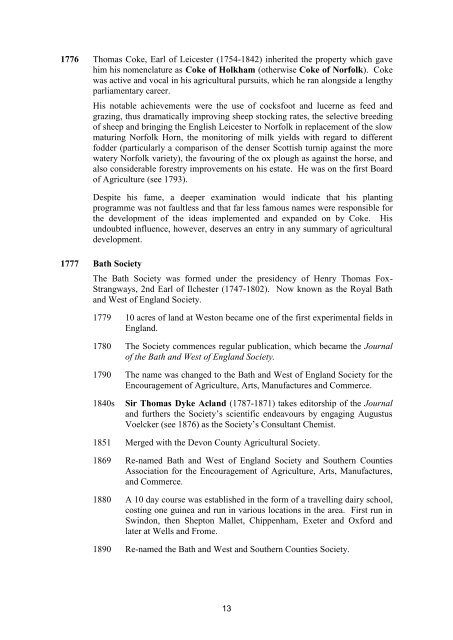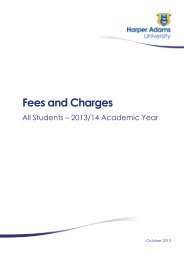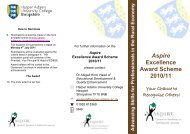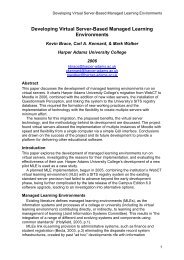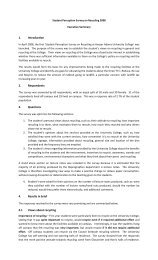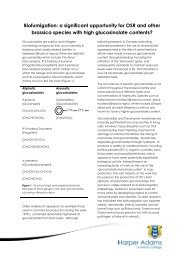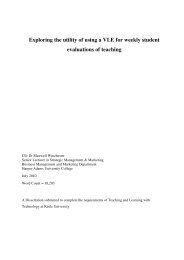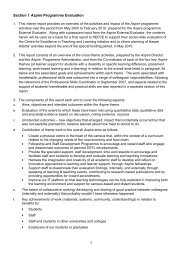1739 Kilsyth, LanarkshireA half acre potato field becomes one <strong>of</strong> the first experimental plantings in theUK.1760 Robert Bakewell (1723-1795) is listed at this date, being the point at which hetook over the tenancy <strong>of</strong> his father’s farm in Leicestershire. Although seen as one<strong>of</strong> the key figures in <strong>agricultural</strong> improvement his work was not whollysuccessful.He did, however, develop ideas on systematic selective breeding, mostsuccessfully with sheep (developing the New/Dishley Leicester from which theEnglish Leicester/Leicester Longwood is descended) <strong>and</strong> horses (breeding theImproved Black Carthorse which later developed into the Shire), <strong>and</strong> rather lesssuccessfully with cattle (the Dishley Longhorn, developed from a Westmorl<strong>and</strong>bull cross, did not survive in Bakewell’s form). His ideas on artificial selectionwere later studied by Darwin.1762 Treatise <strong>of</strong> Agriculture, Volume 1 by Rev. Adam Dickson (1721-1776). Dicksonwas for most <strong>of</strong> his working life the minister <strong>of</strong> Dunse (now Duns), Berwickshire<strong>and</strong> was much missed after his premature death in a riding accident.1770 Treatise <strong>of</strong> Agriculture, Volume 21772 Essay on Manures, which was highly critical <strong>of</strong> Jethro Tull’s convictionthat ploughing alone could produce good soil.1766 The Gentleman Farmer by Henry Home, Lord Kames <strong>of</strong> Blair Drummond(1696-1782). An important advocate <strong>and</strong> judge as well as an <strong>agricultural</strong>improver, Lord Kames was famed for (<strong>and</strong> gained substantial financial benefitfrom) bringing large tracts <strong>of</strong> waterlogged peat moss into productive <strong>agricultural</strong>use.1768 Farmer's Letters to the People <strong>of</strong> Engl<strong>and</strong> by Arthur Young (1741-1820)Young was known as much for his statistical developments (as seen, for example,in Political Arithmetic, 1774) as for his <strong>agricultural</strong> writing <strong>and</strong> experimentation.He also published the Annals <strong>of</strong> Agriculture (1784-1815) which was the mostprominent <strong>of</strong> the 18th century <strong>agricultural</strong> periodicals. His reputation is notwithout detractors, however, <strong>and</strong> he has been described as everything from 'amountebank, a charlatan <strong>and</strong> a scribbler' to a proto-social scientist (per Pr<strong>of</strong>essorMark Overton, University <strong>of</strong> Exeter).1770 A Course <strong>of</strong> Experimental Agriculture described the work on his farm inBradfield, Essex.12
1776 Thomas Coke, Earl <strong>of</strong> Leicester (1754-1842) inherited the property which gavehim his nomenclature as Coke <strong>of</strong> Holkham (otherwise Coke <strong>of</strong> Norfolk). Cokewas active <strong>and</strong> vocal in his <strong>agricultural</strong> pursuits, which he ran alongside a lengthyparliamentary career.His notable achievements were the use <strong>of</strong> cocksfoot <strong>and</strong> lucerne as feed <strong>and</strong>grazing, thus dramatically improving sheep stocking rates, the selective breeding<strong>of</strong> sheep <strong>and</strong> bringing the English Leicester to Norfolk in replacement <strong>of</strong> the slowmaturing Norfolk Horn, the monitoring <strong>of</strong> milk yields with regard to differentfodder (particularly a comparison <strong>of</strong> the denser Scottish turnip against the morewatery Norfolk variety), the favouring <strong>of</strong> the ox plough as against the horse, <strong>and</strong>also considerable forestry improvements on his estate. He was on the first Board<strong>of</strong> Agriculture (see 1793).Despite his fame, a deeper examination would indicate that his plantingprogramme was not faultless <strong>and</strong> that far less famous names were responsible forthe development <strong>of</strong> the ideas implemented <strong>and</strong> exp<strong>and</strong>ed on by Coke. Hisundoubted influence, however, deserves an entry in any summary <strong>of</strong> <strong>agricultural</strong>development.1777 Bath SocietyThe Bath Society was formed under the presidency <strong>of</strong> Henry Thomas Fox-Strangways, 2nd Earl <strong>of</strong> Ilchester (1747-1802). Now known as the Royal Bath<strong>and</strong> West <strong>of</strong> Engl<strong>and</strong> Society.1779 10 acres <strong>of</strong> l<strong>and</strong> at Weston became one <strong>of</strong> the first experimental fields inEngl<strong>and</strong>.1780 The Society commences regular publication, which became the Journal<strong>of</strong> the Bath <strong>and</strong> West <strong>of</strong> Engl<strong>and</strong> Society.1790 The name was changed to the Bath <strong>and</strong> West <strong>of</strong> Engl<strong>and</strong> Society for theEncouragement <strong>of</strong> Agriculture, Arts, Manufactures <strong>and</strong> Commerce.1840sSir Thomas Dyke Acl<strong>and</strong> (1787-1871) takes editorship <strong>of</strong> the Journal<strong>and</strong> furthers the Society’s scientific endeavours by engaging AugustusVoelcker (see 1876) as the Society’s Consultant Chemist.1851 Merged with the Devon County Agricultural Society.1869 Re-named Bath <strong>and</strong> West <strong>of</strong> Engl<strong>and</strong> Society <strong>and</strong> Southern CountiesAssociation for the Encouragement <strong>of</strong> Agriculture, Arts, Manufactures,<strong>and</strong> Commerce.1880 A 10 day course was established in the form <strong>of</strong> a travelling dairy school,costing one guinea <strong>and</strong> run in various locations in the area. First run inSwindon, then Shepton Mallet, Chippenham, Exeter <strong>and</strong> Oxford <strong>and</strong>later at Wells <strong>and</strong> Frome.1890 Re-named the Bath <strong>and</strong> West <strong>and</strong> Southern Counties Society.13
- Page 1: A SHORT HISTORY OFAGRICULTURAL EDUC
- Page 5: ContentsIntroduction 7A Chronology
- Page 8 and 9: key government reports which have b
- Page 10 and 11: It is hoped that this guide has pic
- Page 14 and 15: 1965 The major annual agricultural
- Page 16 and 17: took the £50 per annum post in the
- Page 18 and 19: which he saw as the only means to i
- Page 20 and 21: 1846 Taken over by the Farmer’s M
- Page 22 and 23: 1836 A Select Committee was called
- Page 24 and 25: e found for the production of meat
- Page 26 and 27: 1912 Paper by J C Newsham, Basing,
- Page 28 and 29: 1874 The Agricultural Gazette start
- Page 30 and 31: Christopher. He was a barrister, MP
- Page 32 and 33: 1868 Agricultural and Horticultural
- Page 34 and 35: 1919 The Welsh Plant Breeding Stati
- Page 36 and 37: 1875 Aberdeenshire Agricultural Ass
- Page 38 and 39: 1878 The Chemistry of the Farm by R
- Page 40 and 41: 1949 The College acquired the Lephi
- Page 42 and 43: 1889 Horticultural College, Swanley
- Page 44 and 45: 1890 Agricultural Instruction Commi
- Page 46 and 47: 1979 Re-named Lancashire College of
- Page 48 and 49: 1895 Dauntsey’s Agricultural Scho
- Page 50 and 51: 1906. There had been an impetus fro
- Page 52 and 53: 1952 The Plant Breeding Institute,
- Page 54 and 55: 1898 University of London1898 The S
- Page 56 and 57: 1946 The Sourhope Experimental Hill
- Page 58 and 59: he became the first principal of Wy
- Page 60 and 61: 1908 Knaresborough Rural Secondary
- Page 62 and 63:
Mendel (1822-1884 - the Silesian ab
- Page 64 and 65:
The veterinary field station labora
- Page 66 and 67:
1914 Department for Scientific and
- Page 68 and 69:
1917 Official Seed Testing Station
- Page 70 and 71:
1920s Higher Education - the defini
- Page 72 and 73:
1921 Scottish Plant Breeding Statio
- Page 74 and 75:
1924 National Poultry InstituteThe
- Page 76 and 77:
1928 Hannah Dairy Research Institut
- Page 78 and 79:
c1930Agricultural Entomology Instit
- Page 80 and 81:
1949 Name changed to the current In
- Page 82 and 83:
elderly of Guiseley. The remit of t
- Page 84 and 85:
2009 The college ceased its partner
- Page 86 and 87:
1948 Bridget’s Experimental Husba
- Page 88 and 89:
1949 Gleadthorpe Poultry Experiment
- Page 90 and 91:
1950 The ArchersThe radio programme
- Page 92 and 93:
structures, originally through MAFF
- Page 94 and 95:
1955 Ministry of Agriculture, Fishe
- Page 96 and 97:
1961 Wolverhampton Technical Teache
- Page 98 and 99:
1966 Farm Management Association199
- Page 100 and 101:
1973 Report on Agricultural Educati
- Page 102 and 103:
Wellesbourne in Warwickshire, East
- Page 104 and 105:
• Rothamsted Research, Harpenden,
- Page 106 and 107:
Landex was a revised form of its pr
- Page 108 and 109:
Some Agricultural SocietiesMost agr
- Page 110 and 111:
1819 Scarsdale and High Peak Agricu
- Page 112 and 113:
1848 Northamptonshire Agricultural
- Page 114 and 115:
114
- Page 116 and 117:
IndexNote : the date under which an
- Page 118 and 119:
1889 Abbotsholme School, Uttoxeter1
- Page 120 and 121:
1981 Biomathematics and Statistics
- Page 122 and 123:
1921 Corn Production Acts (Repeal)
- Page 124 and 125:
1918 Fisheries Experiment Station,
- Page 126 and 127:
1881 Institute for Plant Physiology
- Page 128 and 129:
1930 Macaulay Institute for Soil Re
- Page 130 and 131:
1921 Oaklands, College, Hertfordshi
- Page 132 and 133:
1767 Royal Manchester, Liverpool an
- Page 134 and 135:
2011 The Future of Food and Farming
- Page 136 and 137:
1915 Women's Institute1903 Workers
- Page 138:
A SHORT HISTORY OFAGRICULTURAL EDUC


